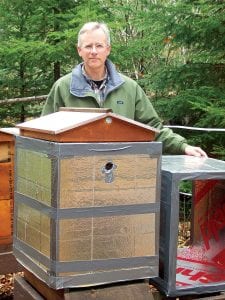The beekeepers of Cook County and Thunder Bay are all abuzz. A critical problem has taken wing with the honeybees up north.
On September 21, Thunder Bay beekeeper Jeanette Momot sent out an email to area beekeepers saying, “It has been a chaotic week.” She went on to say that in the previous week, mites had been identified in an estimated 200 colonies of bees. “Someone has brought in bees with mites, and we don’t know when or where.”
Bees throughout the world have been dying in an epidemic called “Colony Collapse Disorder.” According to a U.S. Environmental Protection Agency article entitled Pesticide issues in the works: Honeybee colony collapse disorder, “During the winter of 2006-2007, some beekeepers began to report unusually high losses of 30-90 percent of their hives.
“As many as 50 percent of all affected colonies demonstrated symptoms inconsistent with any known causes of honeybee death: sudden loss of a colony’s worker bee population with very few dead bees found near the colony. The queen and brood (young) remained, and the colonies had relatively abundant honey and pollen reserves.
“But hives cannot sustain themselves without worker bees and would eventually die. This combination of events resulting in the loss of a bee colony has been called Colony Collapse Disorder (CCD).”
Scientists are looking at the possibility that colony collapse disorder is being caused by parasitic mites or virus.
According to Bob Ewing in a blog entitled Why saving the bees is so important for the world at http://bob-ewing/hubpages.com/hub/, “The main reason that the honey bee is important for our world is as simple as this: if the honey bee does not pollinate the crops, the crops do not grow and produce the food that gets harvested and brought to the store where we buy it and bring it home to feed ourselves and our families.”
Jeanette Momot in Thunder Bay wrote, “…The club wants to try and eliminate the mites by either killing or moving all those bees. We can try, but it is probably too late – drones fly a long way and are welcome anywhere (until fall), and they are the bees most likely to be infected.” Her own colonies have only what she called a light infection, “but the whole yard is then considered infected, so it all needs to go,” she wrote. “I think my bees picked the mites up robbing bear-damaged colonies about 12 days ago – they were upset three days in a row and turned out to be infected. Right now we don’t know where our bees can be moved. And killing them will mean losing our pool of hygienic bees.”
Until now, Thunder Bay and Cook County constituted a unique area that was free of mite-infected bees, and the beekeepers had been working hard to keep it that way by strongly discouraging any imports from places that were not mite-free.
“It is a sad day,” wrote Momot, “—25 years of work gone!”
“This is very sad news indeed,” Cook County beekeeper Mark Ditmanson wrote to his fellow Cook County beekeepers. “I can only try to imagine how discouraging this must be for the beekeepers in Thunder Bay. …Jeanette is concerned about the pool of hygienic bees. We may be needed.”
Keeping Cook County bees alive and well is of even greater importance than usual at this point. Ditmanson wrote to the Cook County News-Herald, “At this season we hobby beekeepers in Cook County face two of the toughest challenges in maintaining healthy bees and preserving our stock of strong hygienic bees which came from Thunder Bay—bears and cold.
“As the bears prepare for hibernation they need to forage for a ton of calories. Most of us use electric fences to keep the nuisance animals away. And we are fairly successful. Cold, however, respects no fence, and that presents a real challenge.
“Bees don’t hibernate – they survive by shivering all winter long. They do so with the purpose of generating heat to keep the cluster of nearly 20,000 to 30,000 bees alive, and most importantly, to keep the queen, who is at the center of the cluster, alive. Some beekeepers just let their bees alone and trust that they will have stored enough honey to consume as they shiver their way toward spring. Many of us in the boreal landscape choose to insulate our hives.
“We in Cook County are more confident about keeping our bees through the cold winter and the long spring than many other areas because we have been able to establish hives without the presence of a pervasive parasite that has been attacking beehives all over our country. These mites in fact have been surmised to be a major contributor to the colony collapse syndrome, causing the death of millions of hives each year.
“We have been able to be ‘mite free’ because we have made a commitment to purchase all our bees from Thunder Bay, which has been able to be ‘mite free’ due to the vigilant efforts of the Thunder Bay Bee Keepers Association and the guidance of Jeanette Momot, a former bee inspector for Ontario and one of the beekeepers from whom Cook County hobby beekeepers have purchased their bees.
“As we make our way through winter we will keep watch on the hives and check them in the later and warmer winter days. Some of us may need to feed the bees just to get them through to the first pollen and nectar of spring.
“…Our friends in Thunder Bay are frantically trying to contain the outbreak. If anyone is interested in taking up beekeeping, we Cook County beekeepers want to discourage the importation of any honeybees from outside the county.
“Cook County and Thunder Bay have had the blessing of being the only geographic regions in North America free of the bee parasite mites. Now Cook County may be the last place to enjoy this status. Help us stay that way.”



Loading Comments